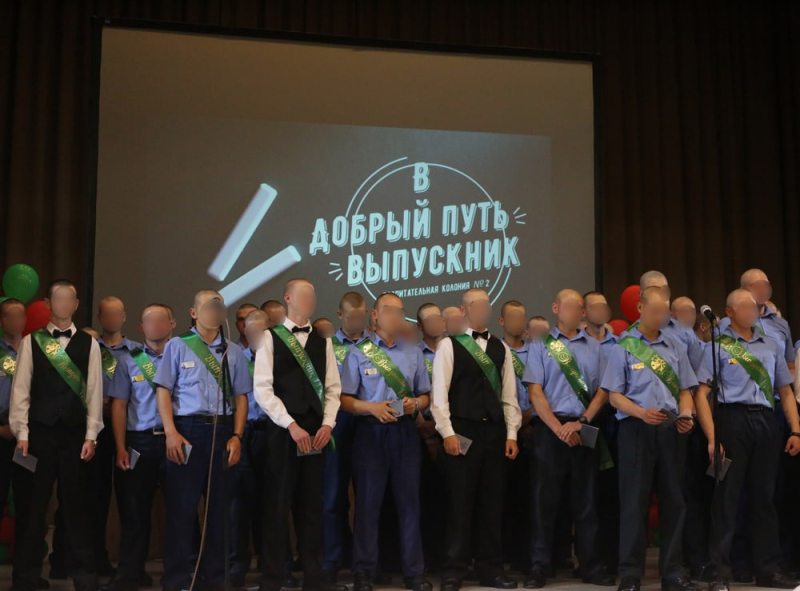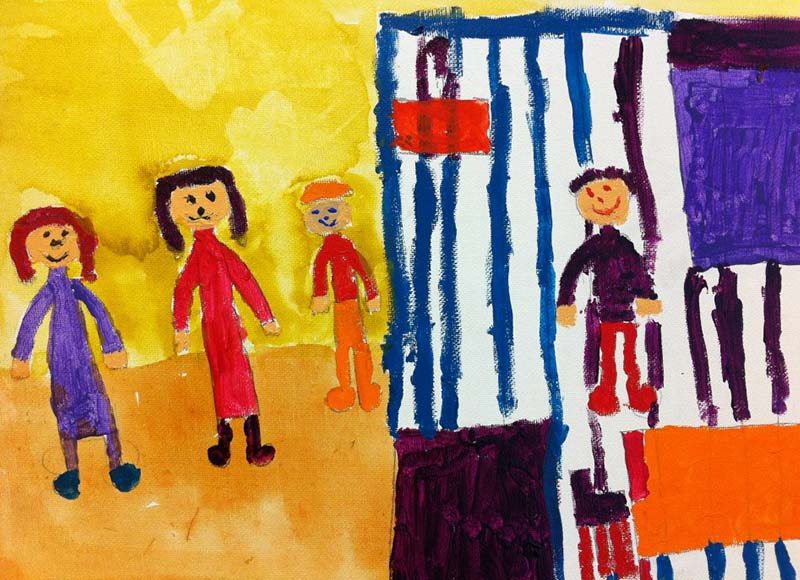Belarusian authorities' repression of minors: violation of international norms and human rights
Since the start of the protests in Belarus, thousands of children have experienced repression due to their parent's arrest and criminal prosecution, and dozens have ended up behind bars. Some minors have even been beaten and tortured. At present, the country has nine political prisoners who celebrated their 18th birthday in prison: Mikita Zalatarou, Siarhei Hatskevich, Eduard Kudyniuk, Maksim Imkhavik, Ivan Patsiaichuk, Dzianis Khazei, Aliaksandr Viniarski, Pavel Piskun, and Artsiom Vaitsiakhovich. All of them were minors at the time of arrest and were subsequently sentenced to imprisonment.
What is the context of the situation?
On World Children's Day on June 1, nine teenagers celebrated as political prisoners. Among them are Mikita Zalatarou, Siarhei Hatskevich, Eduard Kudyniuk, Maksim Imkhavik, Ivan Patsiaichuk, Dzianis Khazei, Aliaksandr Viniarski, Pavel Piskun, and Artsiom Vaitsiakhovich.
Also arrested as minors were Vital Prokharau, David Zbaranski, Daniil Kalesnikau, and Maksim Kuksachenka; they have fully served their sentences and have been released. In September 2022, Maksim Shatokhin had his punishment commuted by pardon and was transferred under home confinement.
But this is not a complete list of repressed children. In 2023, as before, authorities continue to detain young people who are not yet 18.
In April 2023, in Homieĺ, a minor was detained for burning a red-green flag. In a “confession” video, Hleb Shamreyeu said he had been detained for recording a video of his friends and himself burning a red-green flag. The boy “admits” that he had done this while drunk. He was also accused of subscribing to the Telegram channel, which took a critical stance against the government.
In early November 2022, security forces arrested five members of the “Union of the Belarusian National Shield,” against whom a criminal case was opened for “creating an extremist formation or participating in it” (Article 361-1 of the Criminal Code). While some are only 16 and 17 years old, the community was recognized as extremist. In April 2023, the story of persecution continued as pro-government channels reported the arrest of a minor administrator of another Telegram community. They came for him after the boy decided to check himself for “compromising information” in the fake account of the Peramoha plan created by the security forces. His name is still unknown.
The topic of the prosecution and punishment of minors in Homieĺ has come into sharp focus, with some young individuals being penalized under the so-called “people's” Article 342 of the Criminal Code (“organization and preparation of actions that grossly violate public order”). It was reported that on February 28, law enforcement detained 200 people aged between 13 and 21, 183 of whom were minors. The use of batons by the police was reported when the young people were leaving the local shopping mall. All detained minors were handed over to their parents.
In January, the Main Directorate for Combating Organized Crime and Corruption (GUBOPiK) detained two students from the Faculty of History at the Belarusian State University (BSU), Aliaksei Ramanovich and Andrei Yanuk. It is known that one of them was a minor at the time of the arrest. After the students' detention, the university's administration organized a meeting at Dormitory No. 1 for the faculty, which employees of the Investigative Committee also attended. GUBOPiK stated that Aliaksei Ramanovich “will be fined and released.”
In late 2022, it was also revealed that a minor student of the Mahilioŭ College of Arts, Dzmitryi Silin, was detained. In the “confession video” on a pro-government Telegram channel, the young man claims he had been following “extremist” channels and registered on the Peramoha plan. According to law enforcement, the young man had “managed to earn himself many charges,” including “incitement to hatred” (Article 130 of the Criminal Code). His current whereabouts are unknown.
How are minors being judged?
In May 2023, in the Pinsk district court and the city of Pinsk, 17-year-old Kiryl Hranouski was convicted under part 1 of Article 368 of the Criminal Code (“insulting the president of Belarus”). Judge Andrei Bychyla sentenced Hranouski to 24 months of restricted freedom under home confinement.
In Sianno, an 11th-grade student was fined for holding a picket. On March 31, Judge Inna Dosava of the Sianno District Court fined a minor graduate of Secondary School No. 2, a member of the Belarusian Republican Youth Union, and a candidate for a master of sports in Greco-Roman wrestling, Stsiapan Padrez, 74 rubles for holding a picket online. However, the decision was made with gross violations of the current legislation and was overturned by the Chairman of the Viciebsk Regional Court. Specifically, according to Article 3.5 of the Code of Administrative Offenses, the Commission for Juveniles of the Sianna District Executive Committee should consider cases of administrative offenses committed by minors, not by the court. As procedural law requires, the Commission should have considered Padrez's administrative case for Juveniles.
In February, the court of the Žlobin district delivered a verdict to the minor Leon Saldatsenka, who was accused of organizing and preparing actions that grossly violate public order, or actively participating in them (part 1 of Article 342 of the Criminal Code). The case was presided over by Judge Sviatlana Andreyeva. As established during the court investigation, the minor Saldatsenka arrived in the central part of Žlobin on the evening of August 9, 2020, where a protest action was taking place. According to the prosecution's materials, Leon “stood on the roadway and obstructed the movement of public and other transport, shouted various slogans, clapped loudly and whistled.”As a result, the court sentenced Saldatsenka to 18 months of restricted freedom under home confinement.
What are the conditions for minors in detention?
Minors sentenced to imprisonment serve their sentence in the Babrujsk Juvenile Colony No. 2. The facility differs from adult prisons by the number of people. For instance, in 2012, there were only three units here, each housing 80 people, with four educators assigned to each unit. In all other respects, particularly in terms of the strictness of the regime, the correctional colony is on par with adult facilities.
In May 2021, it became known that yellow tags are also used in the colony. In a photograph of the awarding of school certificates to inmates, these tags were seen on some inmates.

- The photo from the Babrujsk Juvenile Colony No. 2 shows some of the underage prisoners wearing yellow labels that are typically used in Belarusian prisons to mark political dissidents.
How are minors used as a means of pressure?
In addition to authorities persecuting minors for political reasons, young people are often used to exert pressure on their relatives. For instance, in December 2022, journalist Larysa Shchyrakova was arrested, and her minor son Sviataslau was handed over to a public shelter by the police. Only after some time his father, who had to come from Russia, could take him from there.
Minor political prisoner Artsiom Vaitsiakhovich was taken into custody on charges under part 1 of Article 208 of the Criminal Code and is being held in a detention center. Meanwhile, his brother, the administrator of a protest Telegram channel, is receiving demands to cease his activities as a condition for Artsiom's release.
What do international norms say?
The United Nations Standard Minimum Rules for the Administration of Juvenile Justice (The Beijing Rules) stipulate:
“Restrictions on the personal liberty of the juvenile shall be imposed only after careful consideration and shall be limited to the possible minimum; Deprivation of personal liberty shall not be imposed unless the juvenile is adjudicated of a serious act involving violence against another person or of persistence in committing other serious offences and unless there is no other appropriate response;
No juvenile shall be removed from parental supervision, whether partly or entirely, unless the circumstances of her or his case make this necessary. The separation of children from their parents is a measure of last resort. It may be resorted to only when the facts of the case clearly warrant this grave step (for example child abuse).”
According to the UN Standard, the juvenile justice system shall emphasize the well-being of the juvenile and shall ensure that any reaction to juvenile offenders shall always be in proportion to the circumstances of both the offenders and the offence. Detention pending trial shall be used only as a measure of last resort and for the shortest possible period of time. Whenever possible, detention pending trial shall be replaced by alternative measures, such as close supervision, intensive care or placement with a family or in an educational setting or home.
Also, in 2019, UNICEF issued guidelines titled “Recommendations for Children in Conflict with the Law.” The British Embassy in Minsk and the National Centre for Legislation and Legal Research were partners of UNICEF in this. The guide aims to introduce the basics of administrative and criminal responsibility for teenagers, their parents, and anyone who will need to interact with representatives of law enforcement and judicial authorities.


















